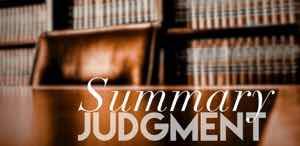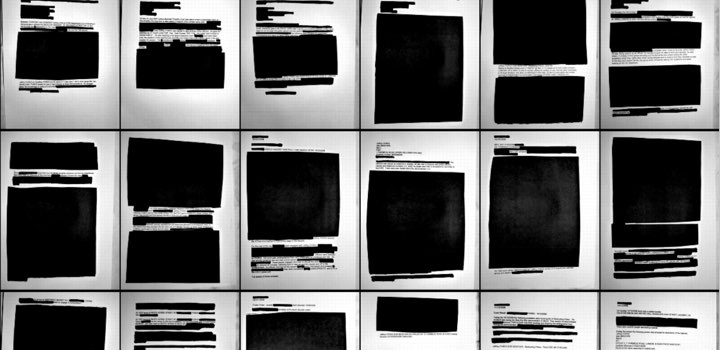Why We Refused to Remove Redacted Axanar Financial Info
Table of Contents
By Carlos Pedraza
AxaMonitor editor
See also: Plaintiffs Cite Peters' Shocking Personal Spending in Asking Judge for Summary Judgment
Amid calls by an Axanar surrogate for sanctions against Loeb & Loeb attorneys for inadvertently disclosing confidential financial information, AxaMonitor was asked to retract what it published.
“It has been brought to our attention that your website and/or blog has, as of this morning, published material that was filed under seal pursuant to court order in this case,” Jonathan Zavin, lead attorney for plaintiffs CBS and Paramount Pictures, wrote me.1)

The studios are suing producer Alec Peters and his company, Axanar Productions Inc., for infringing their copyrights by producing a feature film, Axanar, with $1.5 million Peters raised from thousands of Star Trek fans.
Confidential Financial Information
In its story November 17, 2016, about the studios’ motion for summary judgment, AxaMonitor posted plaintiffs’ quotes critical of Peters’ lavish spending habits with donor funds.
Peters' Reputation 'Damaged'
On his Fan Film Factor blog, Axanar surrogate Jonathan Lane criticized Loeb for the apparently inadvertent disclosure of Axanar’s confidential financial information:
« Outrage over damage to Peters’ reputation is muted by the fact his attorney submitted the same information — unredacted — to the court. »
AxaMonitor published information about Peters’ spending that appeared in portions of the Loeb’s motion that had been blacked out (redacted) under the terms of a protective order governing what evidence gathered in discovery can be publicly disclosed.
Violating Court Order
That protective order required any party inadvertently releasing confidential information to take “all reasonable measures promptly to ensure that no further or greater unauthorized disclosure of Confidential Information is made by anyone.”4)
DEFEATING REDACTION How were we able to read the documents’ redacted text? CBS/Paramount attorney Jonathan Zavin described it like this: “Someone has manipulated the documents to make the redacted portion visible.” No hacking was required; all we had to do was copy and paste from the PDF document, a normal operation for a reporter quoting from court filings.
Removing Confidential Information
To that end, Zavin warned me about the information I published:
This material was sealed and redacted pursuant to court order, and any publication of such material may be in violation of the court order. We hereby request that it be removed from your website and/or blog as soon as possible, and that you inform anyone to whom you’ve given this redacted material, that they should not publish or further distribute this material.5)
I conferred with counsel, considered Lane’s assertions about damage to Peters’ reputation and reviewed the documents in question, as well as other supporting documents filed by both the plaintiffs and attorneys representing Peters and Axanar.
No Retraction
I determined that AxaMonitor will not remove the information gleaned from the redacted documents, explaining in an email to Zavin:
I have decided it would be inappropriate for me as a journalist, covering a story in which there is a public benefit in reporting this information, to retract what I and many others have already published.6)
No Jurisdiction
The protective order applies only to the parties in the case; the court must have jurisdiction over me for the order to apply to my reporting. As I am not a party to this case, I do not believe I am bound by the strictures of the order.
Constitutional Protection
Under the First and Fourteenth Amendments, AxaMonitor is not liable for “truthfully publishing information released to the public in official court records,” even if the information should not have been released, according to Cox Broadcasting Corp. v. Cohn, 420 U.S. 469, 496 (1975).
UPDATE On December 29, 2016, defense attorneys admitted — six weeks after that fact — they made an error in disclosing the same Axanar “confidential and sensitive financial information” the defense had criticized the plaintiffs’ attorneys for inadvertently releasing.7)
The amended exhibits accompanying the December 29 filing were meant to replace the original documents, with the financial information simply removed. The inadvertently filed pages, the defense claimed, “are not relevant to Defendants’ Motion for Summary Judgment.” Axanar attorney Erin Ranahan had already indicated her intent to bar the jury from seeing any of Axanar’s financial data.
The plaintiffs, naturally, want the jury to see how Peters raised and spent $1.4 million, collected from Star Trek fans, on a film he never produced.
Defense Released Same Information in Error
Most importantly, while certain text in the plaintiffs’ partial summary judgment motion was indeed redacted, the information AxaMonitor reported appears unredacted by the defense in documents they themselves released into the public domain.
Lane’s outrage over Peters’ reputation is muted by the fact Peters’ attorney submitted the same information — unredacted — to the court.
As I explained to Zavin:
As you know, Paragraph 5 of the protective order does not confer confidential status to information in the public domain; the defense’s unredacted documents, filed with the court, are in the public domain.8)
Specifically, the information was disclosed in the defense’s own Document 75-4, Exhibit 2 to Oki Declaration, entitled “Paramount Pictures Corporation’s Responses to Interrogatories Set 1, Nos. 4, 5, 8 and 9,” in the answer to Defense Interrogatory No. 8 on page 5.9)
The defense submitted that document the same day as the plaintiffs in support of defendants’ own motion for summary judgment.
I believe the public is entitled to know how Alec Peters spent money he raised in public using Star Trek’s intellectual property. 
Keywords
